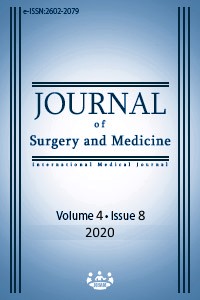Parental anxiety and depression levels associated with challenge tests in children with suspected drug and food allergies
Keywords:
Oral food challenge, drug provocation test, parental, anxiety, depressionAbstract
Aim: Oral food challenges (OFCs) and drug provocation tests (DPTs) are currently the gold standards for evaluating food and drug hypersensitivity, respectively; however, use of these tests on children may generate anxiety and depression among their parents. Our aim was to explore depression and anxiety level among parents of children who were undergoing clinical evaluation via a DPT or OFC. Methods: This cross-sectional study included parents of patients diagnosed with food or drug hypersensitivity reactions in the pediatric allergy clinic between September 2018 and October 2019. Children in Group 1 were subjected to DPT, Group 2 underwent OFC, and Group 3 were healthy controls. Before a child underwent an OFC or DPT, all parents (one parent per child) completed the Hospital Anxiety and Depression Scale, which is a serial assessment for symptoms of depression and anxiety. Results: The study included parents of 105 children, among which Group 1 (n=50 children) were subjected to DPT, Group 2 (n =35 children) underwent OFC, and Group 3 (n=20 children) were healthy controls. In all three Groups, parents were primarily female (62.9%). Anxiety and depression scores were significantly higher among the parents of children in Groups 1 and 2 vs. those of children in Group 3 (P=0.002 and P=0.028, respectively). Anxiety scores were significantly higher among parents of children in Group 2 than those of children in Group 1 (P=0.017). Conclusions: DPTs and OFCs have a significant impact on the emotional status of parents. Parents of children with suspected or documented food allergy experience particularly elevated levels of anxiety and depression before an OFC.
Downloads
References
Sicherer SH, Sampson HA. Food Allergy: A Review and Update on Epidemiology, Pathogenesis, Diagnosis, Prevention, and Management. J Allergy Clin Immunol. 2018;141:41-58
Vickery BP, Burks W. Oral immunotherapy for food allergy. Curr Opin Pediatr. 2010;22:765-770.
Feng C, Kim JH. Beyond Avoidance: The Psychosocial Impact of Food Allergies. Clin Rev Allergy Immunol. 2019;57(1):74-82.
Venter C, Sommer I, Moonesinghe H, Grundy J, Glasbey G, Patil V, et al. Health-related quality of life in children with perceived and diagnosed food hypersensitivity. Pediatr Allergy Immunol. 2015;26(2):126-32.
Cummings AJ, Knibb RC, Erlewyn-Lajeunesse M, King RM, Roberts G, Lucas JS. Management of nut allergy influences quality of life and anxiety in children and their mothers. Pediatr Allergy Immunol. 2010;21:586-94.
Primeau MN, Kagan R, Joseph L, Lim H, Dufresne C, Duffy C, et al. The psychological burden of peanut allergy as perceived by adults with peanut allergy and the parents of peanut-allergic children. Clin Exp Allergy. 2000;30(8):1135-43.
Avery NJ, King RM, Knight S, Hourihane JO. Assessment of quality of life in children with peanut allergy. Pediatr Allergy Immunol. 2003;14(5):378-82.
Flokstra-de Blok BM, Dubois AE, Vlieg-Boerstra BJ, Oude Elberink JN. Health-related quality of life of food allergic patients: comparison with the general population and other diseases. Allergy. 2010;65(2):238-44.
Demoly P, Pichler W, Pirmohamed M, Romano A. Important questions in allergy:Drug allergy/hypersensitivity. Allergy. 2008; 63:616-9.
Aberer W, Kränke B. Provocation tests in drug hypersensitivity. Immunol Allergy Clin North Am. 2009;29:567-84.
Soyyiğit Ş, Aydın Ö, Yılmaz İ, Özdemir SK, Cankorur VŞ, Atbaşoğlu C, et al. Evaluation of drug provocation test-related anxiety in patients with drug hypersensitivity. Ann Allergy Asthma Immunol. 2016 ;117(3):280-4.
Beken B, Celik V, Gokmirza Ozdemir P, Sut N, Gorker I, Yazicioglu M. Maternal anxiety and internet-based food elimination in suspected food allergy. Pediatr Allergy Immunol. 2019;30(7):752-59.
Zijlstra WT, Flinterman AE, Soeters L, Knulst AC, Sinnema G, L’Hoir MP, et al. Parental anxiety before and after food challenges in children with suspected peanut and hazelnut allergy. Pediatr Allergy Immunol. 2010;21:439-45.
Kajornrattana T, Sangsupawanich P, Yuenyongviwat A. Quality of life among caregivers and growth in children with parent-reported food allergy. Asian Pac J Allergy Immunol. 2018;36:22-6.
Aberer W, Bircher A, Romano A, Blanca M, Campi P, Fernandez J, et al. Drug provocation testing in the diagnosis of drug hypersensitivity reactions: General considerations. Allergy. 2003;58:854-63.
Demoly P, Kropf R, Bircher A, Pichler WJ. Drug hypersensitivity:Questionnaire. EAACI interest Group on drug hypersensitivity. Allergy. 1999;54:999-1003.
Muraro A, Werfel T, Hoffmann-Sommergruber K, Roberts G, Beyer K, Bindslev-Jensen C, et al. EAACI Food Allergy and Anaphylaxis Guidelines Group. EAACI food allergy and anaphylaxis guidelines:diagnosis and management of food allergy. Allergy. 2014;69:1008-25.
Aydemir O, Güvenir T, Küey L, Kültür S. Validity and reliability of Turkish version of Hospital Anxiety and Depression Scale. Turk Psikiyatri Derg. 1997;8:280-7.
Knibb RC, Semper H. Impact of suspected food allergy on emotional distress and family life of parents prior to allergy diagnosis. Pediatr Allergy and Immunol. 2013;24(8): 798-803.
De Pasquale T, Nucera E, Boccascino R, Romeo P, Biagini G, Buonomo A, et al. Allergy and psychologic evaluations of patients with multiple drug intolerance syndrome Intern Emerg Med. 2012;7(1):41-7.
Warren CM, Gupta RS, Sohn MW, Oh EH, Lal N, Garfield CF, et al. Differences in empowerment and quality of life among parents of children with food allergy. Ann Allergy Asthma Immunol. 2015;114(2):117-25.
King RM, Knibb RC, Hourihane JO. Impact of peanut allergy on quality of life, stress and anxiety in the family. Allergy. 2009;64(3):461-8.
Knibb RC, Ibrahim NF, Stiefel G, Petley R, Cummings AJ, King RM, et al. The psychological impact of diagnostic food challenges to confirm the resolution of peanut or tree nut allergy. Clin Exp Allergy. 2012;42:451-9.
Downloads
- 644 987
Published
Issue
Section
How to Cite
License
Copyright (c) 2020 Hulya Anıl, Begüm Şahbudak
This work is licensed under a Creative Commons Attribution-NonCommercial-NoDerivatives 4.0 International License.
















